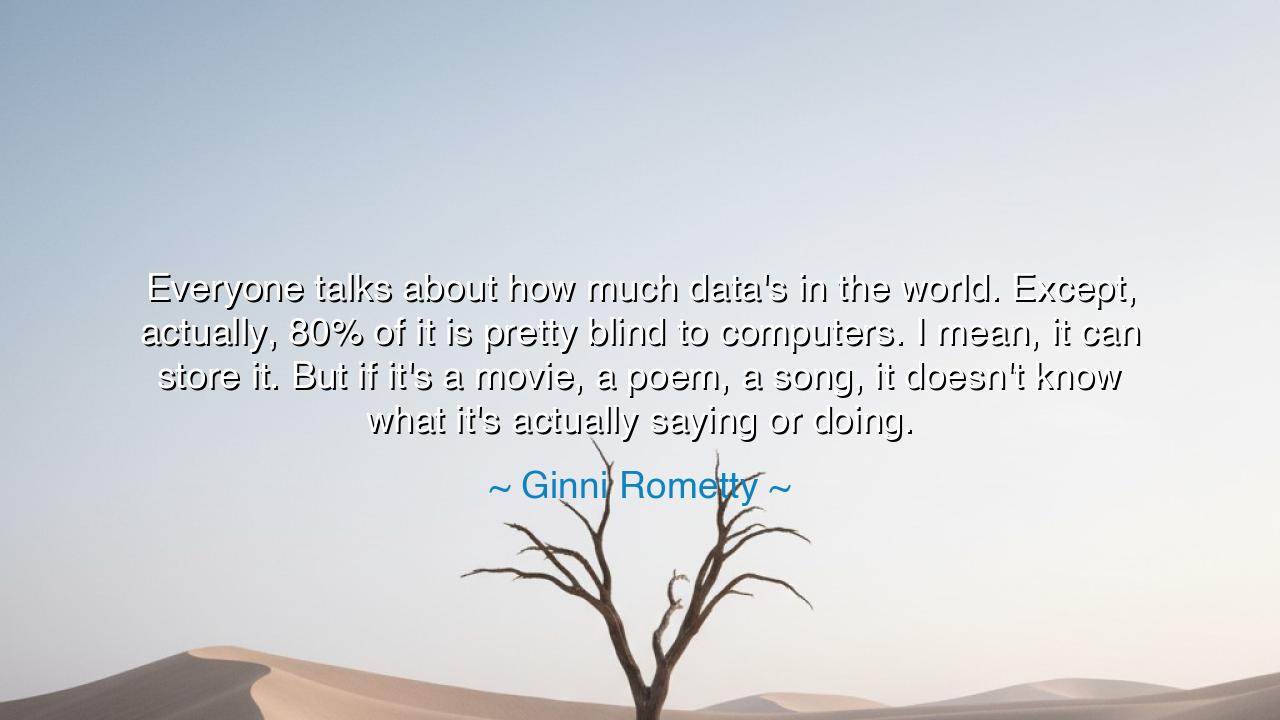
Everyone talks about how much data's in the world. Except
Everyone talks about how much data's in the world. Except, actually, 80% of it is pretty blind to computers. I mean, it can store it. But if it's a movie, a poem, a song, it doesn't know what it's actually saying or doing.






In the wise and reflective words of Ginni Rometty, we are reminded of a truth that stands at the crossroads of technology and humanity: “Everyone talks about how much data's in the world. Except, actually, 80% of it is pretty blind to computers. I mean, it can store it. But if it's a movie, a poem, a song, it doesn't know what it's actually saying or doing.” Beneath this seemingly technical observation lies a profound meditation on the limits of machines and the mystery of the human spirit. Rometty, who once guided one of the world’s most powerful technology companies, speaks not only of data and algorithms, but of understanding itself — the difference between information and wisdom, between storage and soul.
Since the dawn of civilization, humanity has sought to preserve its knowledge — carving symbols into stone, inscribing scrolls, binding books, and now encoding data into invisible streams of light. Yet through all these ages, one truth remains unchanged: that meaning does not dwell in symbols, but in the mind that perceives them. A poem written in ink or stored as binary code is still silent until a heart reads it. A song, though perfectly captured by a machine, carries no emotion for the machine itself. Rometty’s words call us to humility in an age where we worship information as a god — for all the data in the world, without understanding, is still darkness.
The origin of this insight comes from Rometty’s years leading IBM, where she oversaw the evolution of computing into the age of artificial intelligence. Surrounded by data — oceans of it — she recognized that though machines could process, calculate, and categorize faster than any mind, they could not truly know. A computer can measure the rhythm of a symphony, but not feel its sadness. It can analyze the structure of a poem, but not weep at its beauty. It can store every movie ever made, yet remain blind to the laughter, the love, and the longing that move the human heart. Her statement, then, is not about limitation, but about distinction: that what makes us human is not the capacity to record, but the capacity to understand.
Consider the story of the Library of Alexandria, the greatest repository of knowledge in the ancient world. Within its walls were scrolls containing the wisdom of nations — philosophy, science, poetry, and art. Yet when the library burned, that knowledge was not lost entirely, for the greatest truths it held lived in the minds and memories of people — in their stories, teachings, and traditions. In the same way, our modern world, filled with servers and databases, risks becoming a new Alexandria: vast in content but fragile in meaning. Rometty’s wisdom warns us that while machines may preserve our words, it is only humanity that can preserve their soul.
Her statement also touches the deeper nature of intelligence itself. The ancients spoke of two forms of knowing: the logos, which is logic, and the pathos, which is understanding born of feeling. Computers are masters of logos — they can calculate, sort, and reason. But they are strangers to pathos — they cannot love, empathize, or dream. When Rometty says that data is “blind,” she reminds us that sight is more than vision — it is perception, interpretation, and connection. The machine can see the pixels of a painting, but not the sorrow of the artist who painted it. It can read every word of a sonnet, yet never know the tremor of love that inspired it.
And yet, her words are not a condemnation of technology, but a call to partnership. Just as the ancients forged tools of bronze and iron to extend the strength of their hands, we have forged tools of code and silicon to extend the reach of our minds. But these tools must serve us, not define us. It is for us to bring to them the one thing they lack — meaning. To fill the blind data with purpose, to teach the machine not merely to store the world, but to help us understand it. In this, Rometty calls for a union of human wisdom and machine intelligence — a balance of precision and empathy, of logic and love.
Let this be the lesson, then: do not mistake information for understanding. In a world overflowing with data, seek always the deeper truth — the heartbeat behind the numbers, the story behind the code. Cherish the art of interpretation, for that is where humanity’s light shines brightest. Feed your machines with knowledge, but feed your spirit with reflection, emotion, and wonder. For though the computer may one day learn to imitate the sound of a soul, it will never possess one.
So remember, O listener, as Ginni Rometty teaches: it is not the machine that gives meaning to the song — it is the listener. It is not the code that gives power to poetry — it is the heart that understands it. Let us therefore use our tools wisely, to serve the flame of consciousness rather than extinguish it. For the world is full of data, but wisdom — true wisdom — still lives only in the minds that can feel, and in the hearts that can see.






AAdministratorAdministrator
Welcome, honored guests. Please leave a comment, we will respond soon